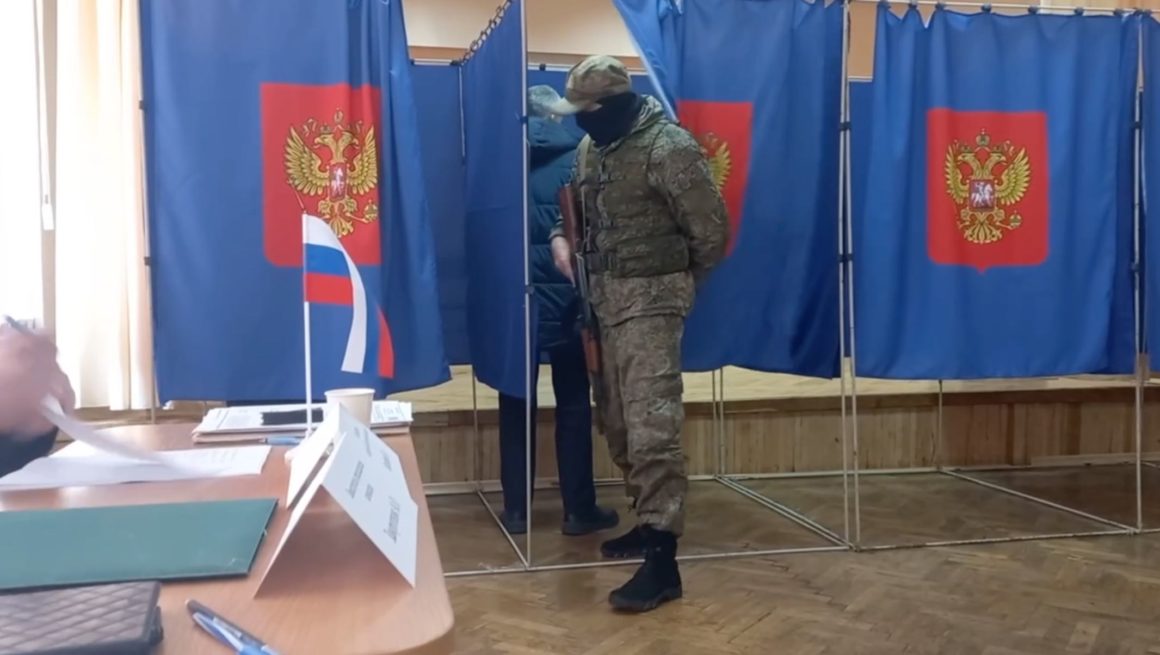On 15-17 March, Russia held "presidential elections" in which incumbent President Vladimir Putin predictably secured his fifth term.
Decried by Western leaders as a "farce," Russia conducted the sham plebiscite also in all the regions it occupies in Ukraine, Georgia, and Moldova, where the "record turnout" announced by the occupation authorities contrasted with empty booths and familiar intimidation and falsification strategies. Here is what transpired.
Repeated scenario of 2023 "parliamentary elections"
Just seven months before the sham presidential "plebiscite," Russia held staged "parliamentary elections" in the Ukrainian lands it is occupying. Their hallmarks were predetermined outcomes, armed "electoral commissions" going around to flats, voting under gunpoint, and Kremlin-appointed international observers.
These "elections" were held by the same scenario, according to Pavlo Lysiansky, director of the Ukrainian-based Institute for Strategic Studies and Security, but with one change. Russia took efforts to conceal the identities of the Ukrainian collaborators working in the election commissions, as the ones from 2023 who were exposed later refused to work again, facing criminal responsibility in Ukraine.
"Record Putin popularity" in occupied lands amid impossible turnout
Russian authorities claimed a "record turnout" of 77.44% in Russia proper, with Vladimir Putin "receiving" 87.32% of the vote.
However, Putin's popularity was even higher in the territories Russia is occupying, if we are to believe Russian official statistics. Apart from the Ukrainian territories annexed by Russia, "voting" was conducted in the occupied regions of Georgia and Moldova, where the following ratio of voters were said to have "voted" for the Russian strongman:
Ukraine
- Temporarily occupied territory of Luhansk Oblast: 94%;
- Temporarily occupied territory of Donetsk Oblast: 95%;
- Temporarily occupied territory of Zaporizhzhia Oblast: 92%;
- Temporarily occupied territory of Kherson Oblast: 88%.
Moldova
- Transnistrian Moldovan Republic: 97%;
Georgia
- Abkhazia: 95%.
- South Ossetia: 97%.
The high turnout in Russian-occupied Ukraine was a lie, according to an interlocutor of Suspilne in Kherson Oblast named Danylo, who managed to evade participating in the pseudo-election.
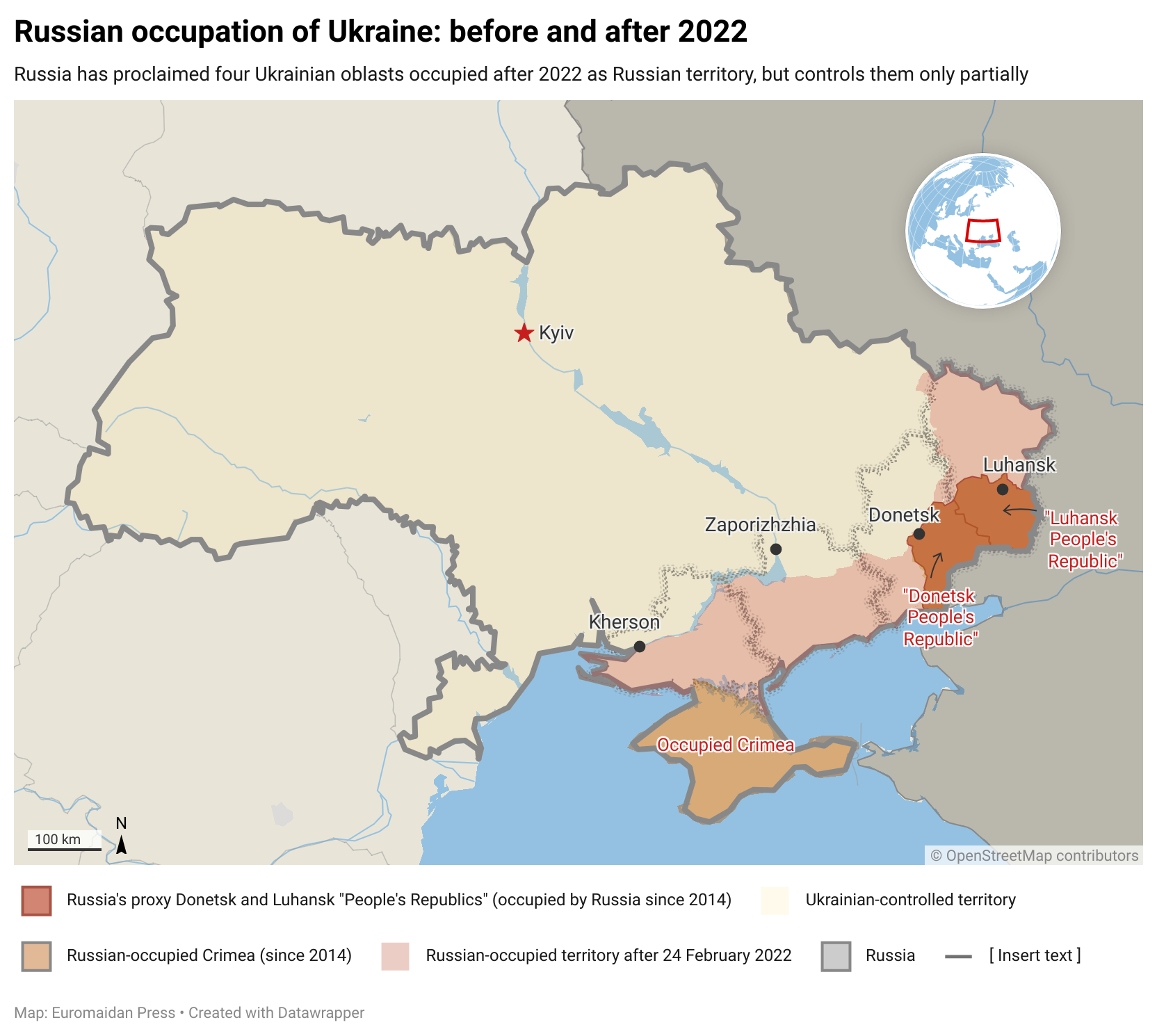
"We stayed at home all day. So did our neighbors. The yard was empty. Few people could be seen. No one came to vote. I understood that [the occupiers] had already [drawn up the results]," the man says.
Moreover, in occupied Luhansk Oblast, more people voted for Putin -- 1.4 million -- than there were registered residents, according to Artem Lysohor, head of the Luhansk oblast military administration.
Furthermore, it was highly unlikely that any register of voters was created in the Russian-occupied Donetsk Oblast in the first place, says Petro Andriushchenko, advisor to the mayor of Russian-occupied Mariupol, making any statistics of a "high turnout" physically impossible.
Ahead of elections, Ukraine's spy chief Kyrylo Budanov claimed, citing intercepted internal statistics of Rosgvardia, the Russian National Guard relocated to occupied Ukraine for the duration of the pseudo-elections, that only around 30% of residents in Russian-occupied Ukraine had planned to attend the sham.
Falsification methods
Various methods of falsification and intimidation were used in Russian-occupied regions of Ukraine, rendering the so-called "elections" a sham.
1) Intimidation, detention of residents. During the so-called early voting conducted from 24 February-14 March, local residents who refused to participate in the pseudo-elections were detained. Such detentions were recorded in Donetsk, Zaporizhzhia, and Kherson oblasts, according to Pavlo Lysianskyi. The detainees were forced to explain to the occupiers why they would not participate.
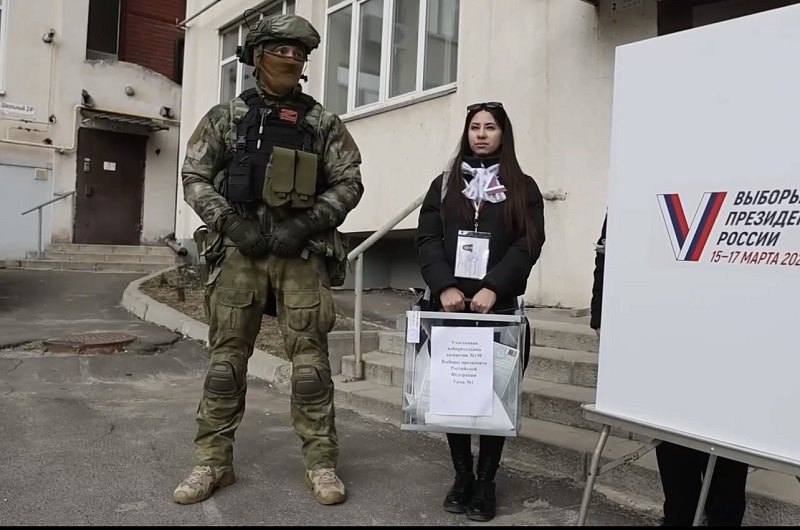
Serhiy Danylov, deputy director of the Center for Middle East Studies who keeps in touch with locals on the occupied territory, told Suspilne that the occupation authorities threatened to repress those who did not come to the polling station, with the punishment being more severe in smaller settlements. As well, compared to previous "elections" in 2022-2023, the occupiers avoided having the soldiers captured on video.
He also said that people locked themselves in their homes and did not open their doors to avoid participating in the illegal elections. And those who opened the doors were afraid because they saw armed Russian soldiers.
"The pseudo-elections have become real terror for the local population. Currently, police patrols are very intense, and security forces can come to people and urge them to vote for their relatives, claiming that they have this right. So, we can record total pressure on people and continuous Russian propaganda," said Alisa Sysoyeva, a correspondent of Hromadske Radio.
2) Influx of siloviki. Unlike the September sham elections, the occupiers increased the number of security forces during early voting. 5,400 Russian National Guardsmen were transported to occupied Donetsk Oblast for this very task, according to Ukraine's National Resistance Center. For every member of the so-called election commission, there were up to 3 security forces who controlled voters during the voting, as per Lysianskyi's estimates.
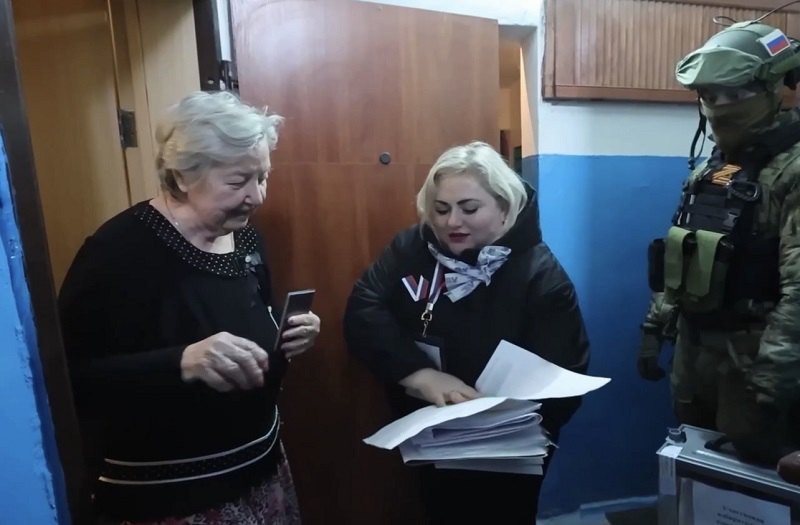
3) Russian soldiers oversaw voting. During both early and general voting, members of election commissions and occupation security forces supervised the voting process. At some polling stations, security forces entered the booths where voters were located.
4) Voting methods with questionable integrity amid resistance of locals to voting. These unorthodox methods included buses with signs "polling station" that pulled over to bus stops with standing people who were forced to participate in the pseudo-election. The occupiers also decided not to transport employees to polling stations but simply sent security forces and members of election commissions to the enterprises, where they forced everyone to vote on the spot, as per Lysianskyi.
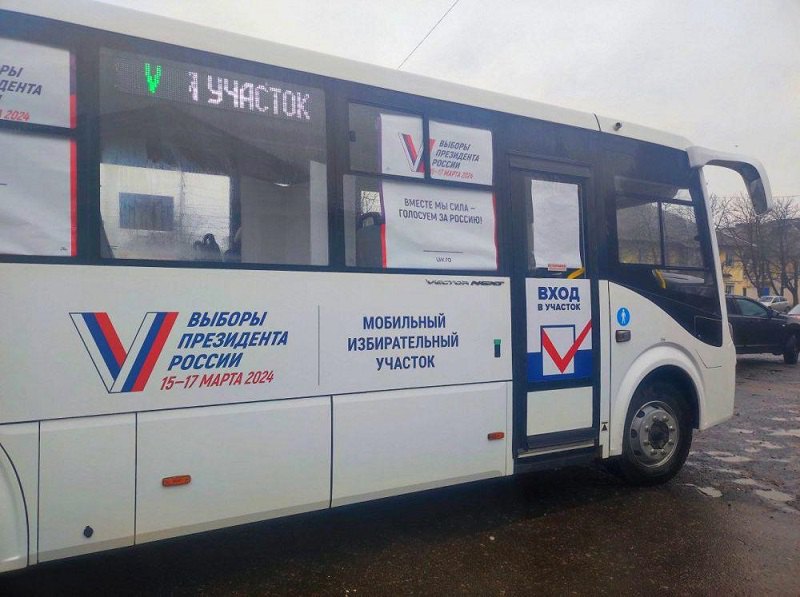
5) State employees forced to display "100% turnout" The people who were intimidated into voting were state employees: doctors, teachers, and city workers, Serhiy Danylov said.
"The 'heads' of the institutions had to report a 100% 'turnout,' and teachers were forced to take pictures at the polling station and present evidence, including geolocation, as proof that they were there, [...] under the threat of dismissal or other sanctions. Because the occupation authorities need to have a video - this is Kalanchak or Skadovsk, here are the polling stations, here are the people," says Danylov.
6) Multiple "votes" cast with two passports or none at all. Petro Andriushchenko, advisor to the mayor of Mariupol, told Ukraine's public broadcaster Suspilne that Ukrainians living in Mariupol conducted an experiment to see how many times a person could vote on the request of the city administration in exile.
The person who had taken a Russian passport from the occupiers but still kept the Ukrainian one was able to vote a whopping 15 times in the "mobile voting groups," where on seven occasions, he was given two ballots, one per passport, with no questions asked.
In another blatant violation of the principle of fair elections, Russia's occupation authorities allowed migrants from Central Asia, with whom they are replacing the Ukrainian population in the occupied territories, to vote without passports, Ukraine's center of national resistance informed.
Additionally, soldiers of Russia's army in the occupied regions "voted" in the "elections" without the need to visit a polling station or present any documents, Ukraine's Defense Intelligence reported. This enabled the Russian soldiers who were recently KIA, MIA, or taken as POW to vote along with the existing military personnel, the Ukrainian agency added.
Pocket international "observers"
Since 2021, OSCE election monitors have not been present during elections in Russia. This means that impartial observation of the voting process is impossible, as there will be nobody to report on violations.
Instead, Russia has resorted to a practice of pocket "election monitors," inviting various figures with questionable impartiality, who inevitably report that no violations were observed.
These elections were no exception. The Kherson regional media Most analyzed who "observed" the election in Russian-occupied areas of Kherson Oblast. It found that citizens from the United States, Chile, France, Algeria, Botswana, and Kenya acted as "international observers" but could hardly be considered professional and impartial.
The observers fall into two categories:
- those with left-wing political views who see Russia as a model of democracy and justice (representatives from the US, France, Chile, and Algeria)
- lesser-known individuals who likely took the opportunity for financial gain (citizens of Botswana and Congo)
Daniel Kovalik, an American journalist, a contributor to Russian propaganda media RT, co-author of the conspiracy theory book "The Plot to Scapegoat Russia," and labor rights lawyer known for his support of Venezuelan dictators Hugo Chavez and Nicolas Maduro, praised the election process as transparent.
"I was very glad to be present here in Kherson Oblast. At the polling station where I was, I saw signs of transparency in the elections," local pro-Kremlin media quoted him as saying.
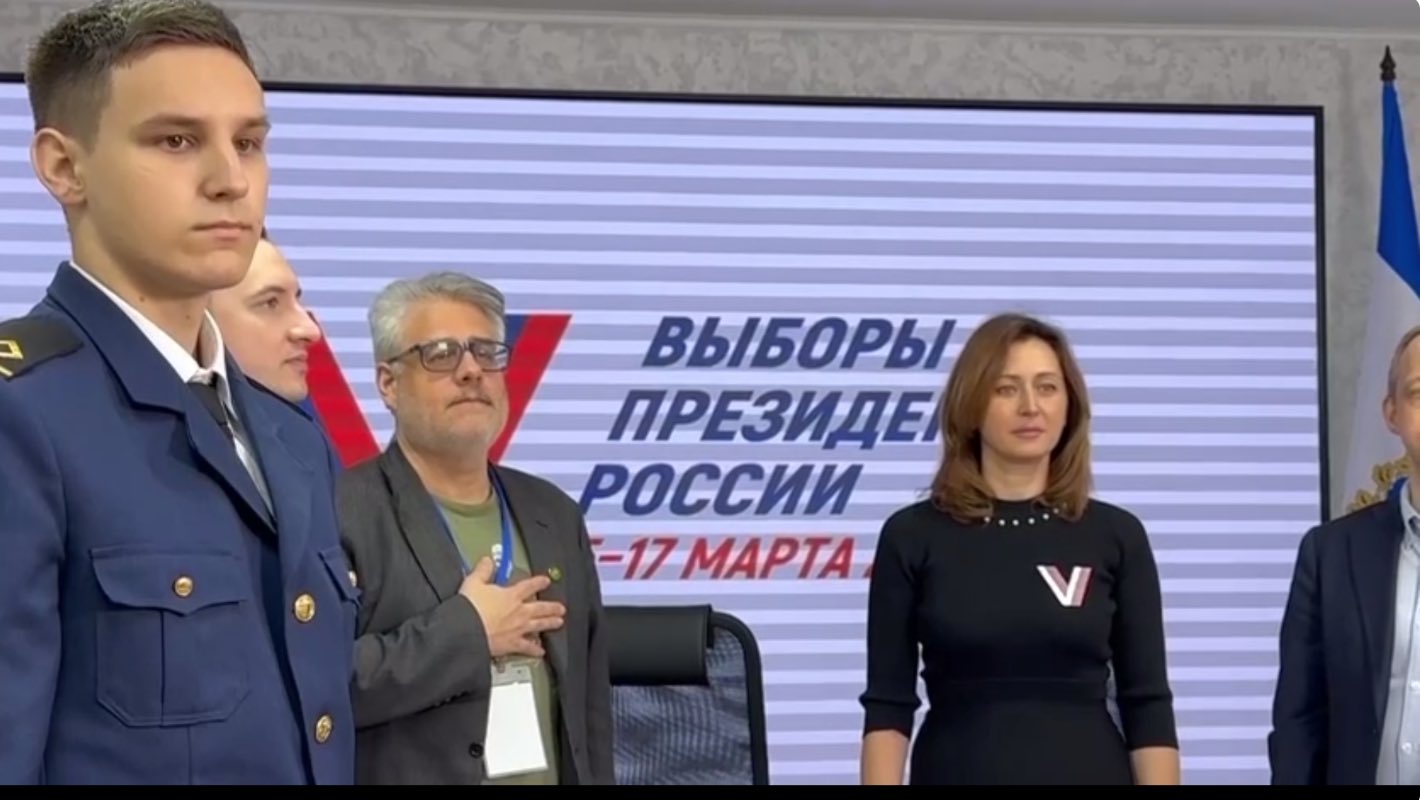
French observer Christian Rol, described by French media as close to the far-right movement, went further in his praise of the Russian occupiers.
"I came from France to observe the voting process. We visited two polling stations where about 150 people voted... I got the impression that people are happy; for them, voting is a choice of a free and independent country... And, in my opinion, there is more democracy here than in France now. People are happy, as if for them it's all some new kind of freedom," he said.
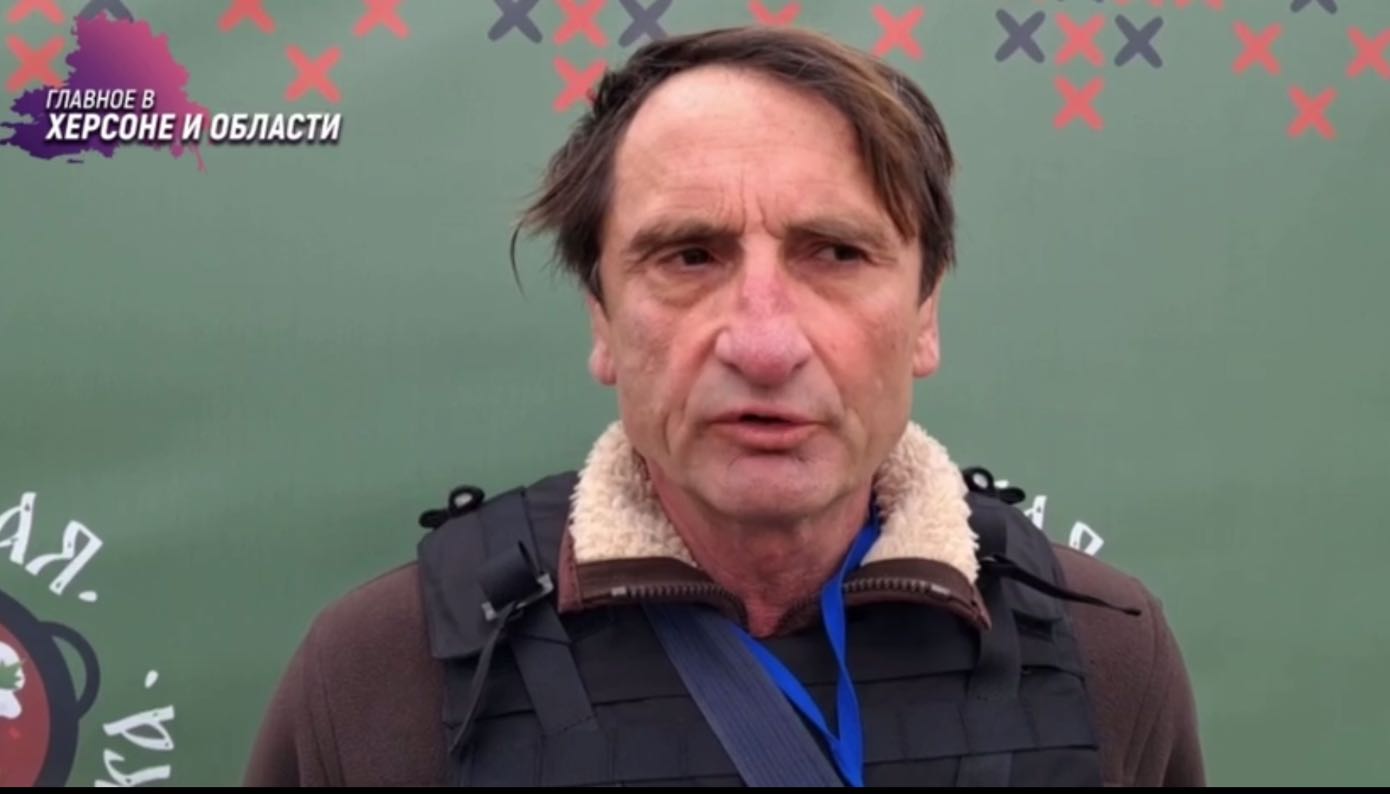
Rol also made derogatory remarks about the French and Ukrainian presidents and spread Russian propaganda narratives. "I saw very friendly people and very happy people who mostly voted for Russia. Most of them voted for President Putin, and this is not surprising, given what Zelenskyy is doing in Ukraine and here," he stated.
Most's report emphasizes that the observers' statements violate the ethics of election observation and the rules of conduct during this work, as outlined in the OSCE/ODIHR-approved Code of Conduct for Election Observers.
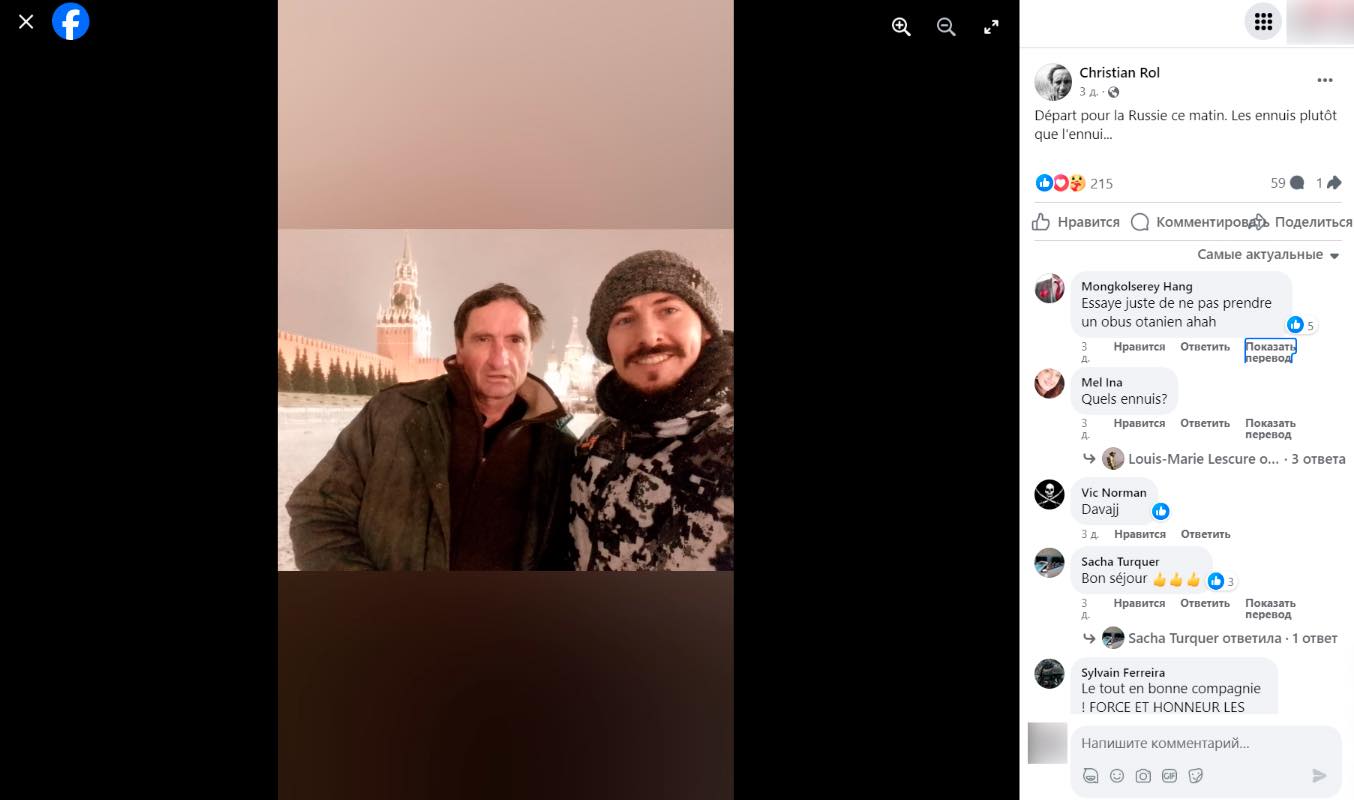
Other observers include Javier Pineda, a Chilean self-described "community activist, lawyer, and specialist in international relations," and Dr. Laid Zoghlami, a lecturer in information and communication sciences at the University of Algiers.
Omolemo Somolekae from Botswana and Ezekiel Kanagi Mutes from Kenya also participated. Both were happy with the way the elections were being conducted, noticing no violations on the occupied territory.
Most concludes that these "international observers" are not genuine election observers, as they lack the necessary authority from their countries or international organizations. Instead, they were brought to the occupied part of Kherson Oblast to create the impression that the international community de facto recognizes these lands as Russian territory.
Democratic countries condemn Russia's pseudo-elections
Nearly 60 UN countries condemned Russia's attempts to hold "elections" in the occupied regions of Ukraine.
"Holding elections on the territory of another UN member state without its consent is a blatant disregard for the principles of sovereignty and territorial integrity. According to international law, such elections have no legal force," their appeal states.
The sham elections were condemned by various western nations as a "farce" and "imitation."
However, no state leaders have heeded Ukraine's call to declare Putin an illegitimate president.
World must declare Putin illegitimate, says Ukraine
In December 2023, Ukrainian President Volodymyr Zelenskyy told in an interview with AP that the world has a choice to denounce the March 2024 "elections" in Russia as illegitimate, but that he wanted the Western world to "independently understand this situation" without the need for Ukraine's advocacy.
Following the sham "plebiscite," Zelenskyy stated that there "was not and could be no legitimacy in the imitation of elections" of the president of Russia. He added that Putin should end up in the dock in The Hague, and this must be ensured by "everyone in the world who values life and decency."
International leaders that congratulate Putin will be legalizing a murderer, Zelenskyy said in another statement, referring to the recent death of Russian opposition politician Navalny in a Russian prison.
In a memo, Ukraine's Central Elections Committee slammed Russia's "elections" in occupied Ukraine as "another cynical attempt by the aggressor state to legitimize the occupation of Ukrainian lands" that "bear no semblance of compliance with the world's generally accepted democratic standards for elections."
"The organization and conduct of elections for representative bodies and officials of another state in the temporarily occupied territories of Ukraine is nothing more than a farce, an example of degradation, a leveling of the ideas of democracy and human rights," the Ukrainian Central Elections Committee stated.
On 23 February, the Committee issued an appeal in which it called upon foreign nations to cease recognizing the powers of "illegitimately elected" President Putin and cease all international cooperation with Russia if "elections" are held in Russian-occupied territories of Ukraine.
Ukraine's Ombudsman Dmytro Lubinets has seconded the call.
"Putin's 'elections' in the occupied territories may allow the international community to raise questions about the legitimacy of the Russian dictator," he said in an interview with Ukraine Now.
He reminded that in previous years, the world "swallowed" Putin's elections in occupied Crimea.
"He should be automatically recognized as illegally elected. The result of such elections is null and void, including from the point of view of international law," the Ombudsman said.
Now the world must go beyond "deep concern," Lubinets says.
"We need to demand, among other things, that our partners respond. Not to be 'concerned once again,' but to act, and to act concretely. We are giving the international community another chance," the ombudsman said.
Former Ukrainian Foreign Minister Volodymyr Ohryzko is yet another figure calling to denounce Putin as illegitimate.
"Logically speaking, if we conclude that the elections were illegitimate, we must make the next step: we must say that the 'winner' of these elections is also illegitimate," the former Ukrainian foreign minister said.
However, international leaders are not hurrying to denounce Putin as illegitimate.
Nevertheless, the Parliamentary Assembly of the Council of Europe has come out with a strong statement, calling to not recognize Putin's legitimacy as president:
"The Parliamentary Assembly of the Council of Europe unanimously urges the international community to no longer recognize Putin’s legitimacy as president. We call on them to cease all contact with Putin, except in the pursuit of peace and for humanitarian purposes, for example, in organizing prisoner exchanges or to bring home the lost children of Ukraine," PACE President Theodoros Rousopoulos said.
Related:
- “You сan’t hold elections in someone else’s country”: Why Russia’s “voting” in occupied Ukraine is a sham (September 2023)
- Western nations condemn Russian elections in occupied Ukraine as illegitimate (March 2024)

